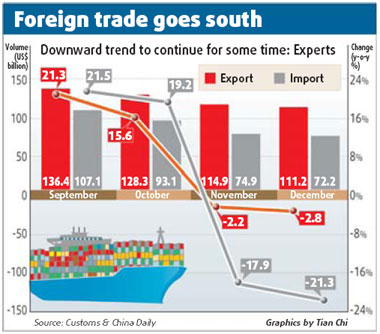China's Exports see 2nd straight monthly fall
Source: CCPIT TEX -- China Daily Date: 2009-01-15
Exports fell two months in a row for the first time in a decade, reflecting the impact of the global financial crisis on the "workshop of the world".

According to an unnamed source quoted by foreign media, exports in December dropped 2.8 percent year-on-year, after falling 2.2 percent in November.
The export and import figures are expected to be released today by the Customs.
Imports in December dropped, too, to 21.3 percent year-on-year, after having fallen 17.9 per cent the previous month.
But since the drops took place in November and December only, the country will still see an impressive 17.2 percent rise in exports and 18.2 percent increase in imports for the whole of last year. The previous year's records were much more impressive, though, with exports and imports both recording a 20-plus percent growth.
Last month, the exports and imports volumes were $111.2 billion and $72.2 billion - and in November, they were $114.9 billion and $74.9 billion.
The falling trend in exports is likely to continue in the first two quarters of this year, some Beijing-based trade experts said yesterday.
Su Chang, macroeconomic analyst with China Economic Business Monitor, said foreign trade could decline further and would pick up when the US economy showed signs of recovery.
The country is likely to see "almost zero growth" in exports in the first quarter of this year, and perhaps "a fall of 6 percent" in the second quarter, Su said.
The drop in exports has been attributed to falling demand in the European Union (EU) and the US, the country's top two trade partners.
Ma Jun, Deutsche Bank Greater China's chief economist, said that given the state of the EU economy, China's exports could grow only 6 percent this year.
The trade experts said the other threat to Chinese exports could come from Vietnam, India and Pakistan because they are offering lower prices for goods being made there.
The government has announced a $586-billion package to boost domestic demand. But, Su said, it is too early for those measures to have taken effect.











